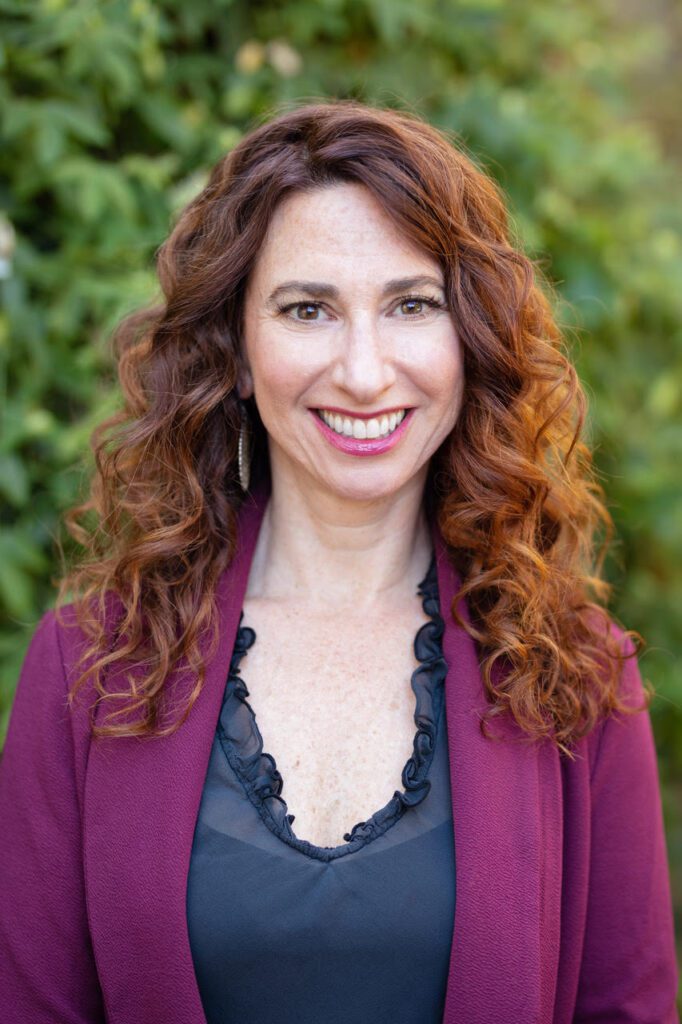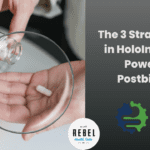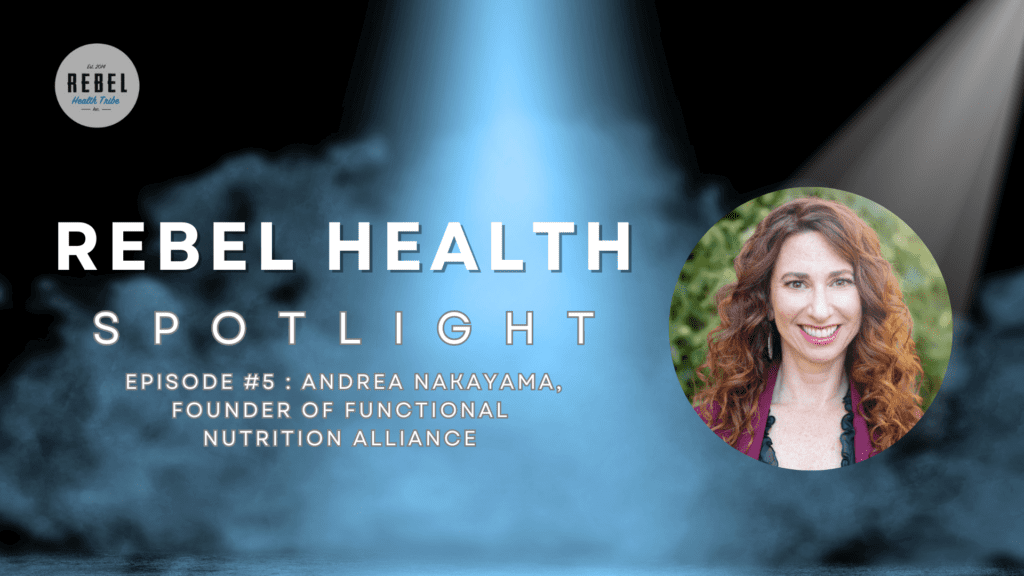
Play Video
Rebel Health Tribe Spotlight – Episode 5: Andrea Nakayama
For additional information on Andrea Nakayama, check out these resources:
Website: www.andreanakayama.com
Home: fxnutrition.com
Training: fullbodysystems.com
Clinic: fxnutrition.com/the-clinic
Podcast: 15minutematrix.com

Andrea Nakayama
About our Guest
Andrea Nakayama is an internationally known Functional Medicine Nutritionist, educator, and speaker who is leading a movement to transform the health industry into a system that WORKS, empowering patients and practitioners alike with the systems and tools of Functional Nutrition. Andrea founded Functional Nutrition Alliance in 2009 to both serve the patient population, and eventually further educate health practitioners in both the science and physiology of nutrition and the Functional Nutrition practice. Her training, Full Body Systems, provides professionals of diverse backgrounds with advanced tools and the depth of knowledge necessary to effect substantive changes in the lives of their own clients and patients.
Andrea is celebrated as a leader in the field of Functional Nutrition because of her unique ability to teach and inspire practitioners and patients alike. She synthesizes art and science, empathy and physiology, intuition and problem solving, into a system that truly helps people get to the root causes of their illness, create a path towards wellness, and find their way back to life.
Webinar Transcript
Michael Roesselin:
And we are recording another episode of Rebel Health Spotlight. I am here with my friend Andrea Nakayama. Welcome.
Andrea Nakayama:
Thank you.
Michael Roesselin:
Yeah, thanks for doing this. These have been really fun so far, and I’m excited for you to share with our audience a little about yourself. And this is where in a normal interview, I would read some sort of pre-prepared bio about the person I’m sitting across from and talking with. But for this, we’ve kind of scrapped that model and we want our guests to share who they are and what they do with the audience in their own words as that currently exists. So, I know that you have a lot of kind of iterations of your work, and for those who don’t know, Andrea was one of the first people I ever saw on an online health thing when Sean Croxton, for all the OG health summit watchers out there, hosted his summits at least, I’m going to date myself, but probably like 13 years ago maybe.
Andrea Nakayama:
Yeah, I think so.
Michael Roesselin:
And you were a guest on there, and I heard your story and it was excellent, and you’ve done so much cool work since then. So, I guess the floor is yours to kind of just introduce yourself a little bit and what you’re doing in the world.
Andrea Nakayama:
Yeah, thank you. And I guess speaking of OG, I’m a OG functional medicine nutritionist and also an OG online course builder. I think I was in the space before a lot of the others came on board. So, I am the founder of the Functional Nutrition Alliance and also now founder of andreanakayama.com. So, working with both the people who are looking to train to be functional nutrition counselors and then turning my attention in the andreanakayama.com arena back to the patient population, not as a clinician, but as an educator. How do we rethink our care and our self-healthcare through a functional nutrition lens?
Andrea Nakayama:
So, when I talk about that OG perspective, I’m really bringing in a lot of the cultural competency, the understanding of antecedents such as trauma and triggers throughout our lives that impact our health, and recognizing that broader terrain that impacts health rather than taking this very narrow approach. And I can speak more about that, but I think functional medicine has gone in a very narrow lens where we’re targeting a specific condition, sign, symptom, or diagnosis instead of taking that systems biology lens. I am a practitioner of systems biology. I love the science and I love the science as a way to understand the whole, and I’m committed to that practice and to the recognition that we are all unique in our health journey, and helping other practitioners to embrace that approach.
Michael Roesselin:
That’s really interesting. Thank you for sharing that and for all that you’ve created, and the training practitioners is a way to multiply your impact, because then each one of them goes on to help tons of people, and I don’t know how many practitioners have been through your trainings, but it’s a lot.
Andrea Nakayama:
Over 8,000. Yeah.
Michael Roesselin:
Yeah, wow. And if you multiply 8,000-
Andrea Nakayama:
Yeah, in 68 countries.
Michael Roesselin:
… times, in 68 countries, if you multiply that times how many people they reach, it’s a very, very wide impact. And the mention of systems biology, it’s interesting that, and I agree, because the title of an event that I’m actually, we were talking before we went on air that I’m going to be co-hosting for HealthMeans that’s going to air in the spring of 2024 is titled Beyond Functional Medicine. And the whole purpose of the event is to discuss the ways in which functional medicine tends to be a little narrow in its approach, which I mean if you compare it to conventional medicine, it’s very wide.
Andrea Nakayama:
Right.
Michael Roesselin:
But as a whole, it’s still missing so much, you said width, I usually say depth, but it’s kind of the same situation where there’s things, you mentioned trauma, you mentioned societal things. There’s a whole host of areas outside of the conventional functional medicine scope, and you mentioned systems biology, and the roots of functional medicine really came from things like systems biology or naturopathic, like traditional naturopathic medicine and traditional Chinese medicine and Indigenous medicine, which all do address those things. But then it almost kind of put on the white coat and focused itself on a very narrow application. I don’t know if you could speak to that a little.
Andrea Nakayama:
Yeah, and I’ve seen that happen over the expanse of my career. So, really coming into the world where there was a broader understanding, and the reason I like to say width, and I love that you’re saying depth, is because I think of it as the soil or the terrain that the roots live in. So, as a functional medicine nutritionist, my job and the job I’m training others to do is to nourish the roots. It’s not to target the roots, but to nourish the roots. And in so doing, we impact the roots, and when we impact the roots, we impact the branches, and that’s how we really see a result that we’re looking for in our efforts and in our works. We see those outcomes.
Andrea Nakayama:
And for me, I know that you’re familiar with my story, but I really experienced a lot of the gaps in traditional medicine when my husband was diagnosed with a brain tumor back in April of 2000. That experience for me was like bootcamp, this is before I was a practitioner, but it was like a bootcamp in understanding what was addressed and what wasn’t addressed. And I won’t say that there wasn’t a lot addressed. He had brain cancer, he had a very aggressive tumor, he went through chemotherapy, radiation, two surgeries, a lot of things that we have to rely on medicine for, and, and this is the yes and for me, there was a lot we could be doing to affect his outcomes that wasn’t within the scope of the medical practitioner.
Andrea Nakayama:
So, for me, it’s not only that functional medicine has gotten more narrow and in step with a lot of allopathic practices where it’s protocol for condition, but also that we’re leaving out all the dietary and lifestyle factors that we now know, evidence shows us, do make a difference. Whether that’s meditation or stress reduction or sleep, or poop, or blood sugar balance, these lifestyle factors have tremendous impacts on our health outcomes. And what I’m really a proponent of is recognizing where we have to and where we can as clients and patients sink our teeth into those practices sometimes in addition to doing standards of care, standards of functional medicine care or standards of allopathic care, and sometimes in lieu of, and it really depends.
Michael Roesselin:
That’s interesting. Thank you. And I’m seeing this kind of evolution in so many people from this industry, not as many as I’d like, but five years ago when I started really diving into what I’ll call the other side of healing or the roots or the width or the things outside of functional medicine, the emotional, the mental, the trauma, the energetic, the spiritual, the nervous system, because even that is only kind of on the fringe of functional medicine at this point, it was weird to a lot of my functional medicine and nutritionists kind of friends. They were like, “Oh, huh.” And then I would get messages from a lot of them. I was like the person they would ask the questions about with the things that they didn’t know, but they knew that it was important, but they didn’t know how to, and now I’m seeing a lot of them.
Michael Roesselin:
Like one of my functional medicine friends just shifted her whole focus to emotional wellness and stress reduction for moms who are overwhelmed, and she was doing functional medicine for moms before, but she saw that they were unsupported in so many other ways that the functional medicine stuff she was trying to do with them-
Andrea Nakayama:
Exactly.
Michael Roesselin:
… was marginally effective.
Andrea Nakayama:
Yes.
Michael Roesselin:
And that if you’re in this stress incubator without support and purpose or ways to express emotions or any of these things, supplements and lab testing are only going to get you so far. So, I love to see that evolution, especially in people that are teaching and training and educating and kind of thought leader level, because that’s how the real influence kind of changes. So, I’m curious, I’m guessing your work with andreanakayama.com is going to be more along those lines, and what about that shift for you really kind of lights you up? Why is that so exciting?
Andrea Nakayama:
Yeah, I mean, I love being in the classroom. I love being with people in the journey and the process and the wake up, and I’m a huge lover of systems, not just systems biology, but systems of thinking, what might be considered mental models. So, giving people the way to rethink or reframe their approach to how they’ve been going at something before. And so the systems, the mental models that I’ve created within the practitioner training, are ones that I believe can really be useful for the patient who is sick and not getting better, which is a growing number of people. And what I’m seeing is people adopting standards of care, even from a functional perspective, let’s say getting that test or taking those supplements or adopting a dietary protocol, and it doesn’t work for them. And then they’re pissed. They’re pissed off because they’ve done all this work, they’ve spent all this money and they feel nowhere for it, and then they’re resentful of the interventions.
Andrea Nakayama:
And so for me, there’s a really ripe territory there where we can tune back into ourselves, slow the process down, really understand what’s going on in our own nervous system in response to things in our own body as we’re reactive to things. And I just love that opportunity for growth and expansion and seeing people light up and make connections and realize that the answers aren’t outside of themselves, they’re actually inside of themselves. And again, that’s constantly what I’m trying to really help practitioners see, that it’s not their job to fix people. We are not broken. From a functional perspective, there’s more in our bodies that’s functional than not, most of the time if we’re up and walking around and doing our thing.
Michael Roesselin:
Yeah, you’d know right away if that ratio changed.
Andrea Nakayama:
Yes, exactly. Exactly. So, just helping people to see that distinction and where we can all be guides for others and where we can be better guides for ourselves is, just for me, just I love it. I love it so much. I love being with people in that process of discovery and wake up and that whole reframe that can happen that isn’t about a particular approach, it’s about a mindset shift, even though I don’t think of myself as a mindset coach.
Michael Roesselin:
No. Yeah, that makes a lot of sense, and it’s really empowering, that approach with people too, and more of like a teammate with them than… The hierarchy, the structure of this type of work seems to be changing, at least on that side of things. I’ve been through a couple more spiritual meditation-y type training programs in the last five years, and the consensus over there is the age of the guru is finished. That used to be the thing. For like 20, 30 years, there was all these gurus who would just sit there and teach everybody and everyone would learn from them and that would be the thing, and then you’d have to get the transmission from the guru or you couldn’t do the thing. And now most of those communities in that type of work, and even amongst Buddhist communities and things, the age of the guru is finished, that it’s more about showing people how to identify, to be able to listen to and trust and hear their own guidance.
Andrea Nakayama:
Yes.
Michael Roesselin:
And from a far more Western standpoint, or analytical, is I’ve been through Dr. Gabor Maté’s training for therapists, who published a book called When the Body Says No, I don’t know, now it’s probably like 25 years ago. And he was scoffed at and ridiculed and attacked for writing this book that talked about how ignoring your no when it comes to, “Can you do this? Will you do this?” or doing a job that you hate or a relationship that’s unhealthy or whatever, he put really strong evidence in that book that when you don’t listen to yourself, there’s a lot of different disease processes that are correlated to that. And that was there 25 years ago, and so now, it’s really interesting to see this talked about so much. Not only is it, in my experience, empowering for people to get this permission to listen to themselves, it also will shift the very thing potentially that you’re saying this protocol didn’t fix for them-
Andrea Nakayama:
Exactly.
Michael Roesselin:
… that they then became bitter towards. It wasn’t the protocol, it’s this inner situation. And it’s just really fun for me to start seeing some really high-level educators and teachers and practitioners start stepping in that direction, because it has to happen, that shift in [inaudible 00:14:24].
Andrea Nakayama:
And we’re so far from it. We’re so attuned to all the noise outside, all the supplements, all the tests, all the opportunities to fix us and heal us that we don’t even know, people don’t even know what they feel anymore. That reality is a place that requires slowing down, requires that parasympathetic dominance that we don’t have. We’re in a sympathetic dominant mindset, or activities, all the time seeking, looking, what could I do? What could I make better? How do I solve this? That is not helping the nervous system, and then not helping the nervous system, as you know, doesn’t help us to heal. So, for me, it’s all connected to each other, and I think we’re often overcomplicating things that are much more base in where we can spend our time for healing.
Michael Roesselin:
I definitely agree. I used to, I haven’t worked with clients one-on-one in the health space for a while, but when I did, people would come in and they’d be like, “I want to run these six lab tests. I want to take these supplements. I want to do the protocol for this,” or, “What protocol do you have for this condition or this thing?”
Andrea Nakayama:
Exactly.
Michael Roesselin:
And I’d be like, “What time do you go to bed?”
Andrea Nakayama:
Exactly.
Michael Roesselin:
And they would say like, “Well, one o’clock, because I’m up really late researching these things.”
Andrea Nakayama:
Exactly.
Michael Roesselin:
And I’m like, “What’s your job?” Like, “Oh, my boss is an asshole and he yells at me all the time.”
Andrea Nakayama:
Exactly.
Michael Roesselin:
I’m like, “Okay. Well, let’s get you into a situation where you actually can tell what you feel and go from there.” But they didn’t want that, because they’d been on this do more, do it harder, do it faster, do it louder, do it.
Andrea Nakayama:
Yeah, and I even find that-
Michael Roesselin:
And I didn’t even realize that until I moved over here to a place where the culture is slower and meals are slower.
Andrea Nakayama:
Yeah, totally.
Michael Roesselin:
And things are slower and people aren’t in a hurry, and there’s signs on the windows of shops that say like, “Closed. Tired.” Imagine that, imagine seeing that in the US, people would go on Yelp and write angry reviews. “Closed. Tired” is good. That’s good.
Andrea Nakayama:
Yes, exactly. Exactly, and I noticed how sexy all those fixes are to us because of that constant quest, and I like to think of what we’re talking about as the simplicity on the other side of complexity. So, what I mean by that is I understand systems biology. I understand how stress and sleep and blood sugar impact the microbiome and the mitochondria and methylation. I can talk to you about all those things. However, if we don’t do those things, we’re missing the opportunity not just for those interventions to help us, but to actually invite sustainable healing. And I think that for me, that’s where if we bring people back to, “Wait, slow it down, get rid of that protocol. Where is your attention?” And we bring it back to, again, those base things, the things we might think of as simple. Michael, a good example of this is hydration. It’s a simple thing to talk about.
Michael Roesselin:
Well, let’s just go into simple practices.
Andrea Nakayama:
Yeah.
Michael Roesselin:
Because we’re at about the end of the conversation. We like to leave people with a few simple practices. That was a perfect segue. So, what are a few of these slowed down, simple practices that you like to see people take?
Andrea Nakayama:
Yeah, there’s so many ways I can talk about this, but I’m going to say my non-negotiable trifecta is sleep, poop, and blood sugar balance. And when we think about blood sugar balance, everybody’s ready to go get a CGM and track all their things. I’m going to just say fat, fiber, protein. Every time you eat, fat, fiber, protein. That’s going to be different for each of us, but just start bringing attention to, “Do I eat fat, fiber and protein at every meal?” I mean, a lot of people who are eating high fat diets, high protein diets may not be getting enough fiber. If you’re eating a high fiber diet, you may not be getting enough protein. So, just bring your attention, get rid of numbers and grams and worrying about it, and just start thinking, “At every meal, am I eating fat, fiber, protein? Do I know if I’m eating fat, fiber, protein?” Get playful about it, and that way, with that equation, we actually are addressing one of our non-negotiable trifectas probably more than once. If there’s sleep, poop, and blood sugar balance, fat, fiber, protein’s going to help us address all three.
Michael Roesselin:
Great. And you mentioned hydration.
Andrea Nakayama:
I know, hydration. It’s hard not to talk about hydration, but I was going to say a lot of people experience fatigue and they might not realize how something as simple as hydration could impact even those lab markers that they’re trying to address. So, they’re looking at their labs, they’re thinking about supplements. I could look at somebody’s red blood cell function and their iron and ask, “Are you drinking enough water?” And then they’re like, “Oh, no,” but they were ready to go on a whole supplement regime to address the red blood cell function, their iron and their ferritin, when something as simple as hydration could shift the entire terrain. And so really remembering where we bring ourselves back to some of the baseline functions and then see what we need from there.
Michael Roesselin:
Okay. And then I have one final question. You mentioned you like to help people start to listen to themselves and kind of find their own way, and how that’s like a foreign concept to a lot of people now because our culture’s so fast and crazy, and be more productive, be more this, be more this, be more this. If you were talking to someone and you said that and their eyes just kind of glazed over and they don’t know what you mean, where would you start in either teaching someone how to listen to themselves or what that actually means? If that first way of explaining it, you just get a blank stare…
Andrea Nakayama:
Yes.
Michael Roesselin:
Because you might’ve got a blank listen earlier-
Andrea Nakayama:
Totally.
Michael Roesselin:
… on here, so what’s the approachable way to start to do that?
Andrea Nakayama:
Yeah, I mean, the simple answer, the one-word answer is tracking. That too can be complicated because we might be talking about food, mood, poop tracking. We might be talking about sleep tracking or hydration tracking or cycle tracking. I have to really tailor where and what kind of tracking is going to work for the individual. So, for example, if somebody’s really pissed off about making any dietary changes and they’ve just been a big FU to any dietary change, they may not be in tune with what works and what doesn’t for their body. And we might just need to say, “Bring in, let’s trial three different breakfastes or bring in some colorful plant-based foods. How do you feel?” It’s a very slow process for some, and others can be more accelerated, but it is a journey back to oneself, and that’s going to be a different starting place for everybody.
Michael Roesselin:
Beautiful. All right, well, we’re going to wrap this one up. We’re going to record a little bit more in depth on some of those topics for that Beyond Functional Medicine event, where you’ll be able to catch Andrea. We’ll put the links to both of your endeavors below.
Andrea Nakayama:
Yeah, thank you.
Michael Roesselin:
And any social media or anything else where people can find you. And I just really appreciate the time and your sharing, and it’s so refreshing to hear this coming from thought leaders in the industry who are educating people and really have an influence on the way that things are taught and done. And I’m ready to watch the next wave, or how this is going to play out or how it’s going to go, and I think it’s going to be something that’s going to help a lot more people.
Andrea Nakayama:
I agree.
Michael Roesselin:
So, thank you so much.
Andrea Nakayama:
Thank you, Michael. Yeah, thank you.






